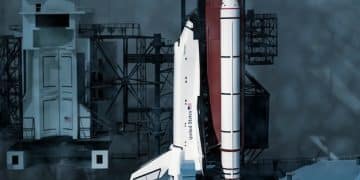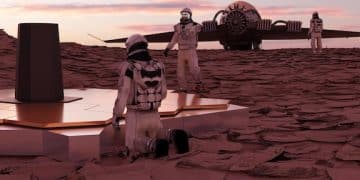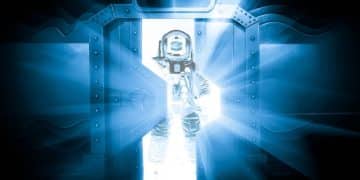AI in Space: Revolutionizing Exploration Efficiency and Effectiveness

The increasing use of artificial intelligence in space exploration promises to significantly enhance the efficiency and effectiveness of future missions by automating complex tasks, improving data analysis, and optimizing mission planning. AI algorithms can also enable spacecraft to make autonomous decisions, reducing reliance on human control and improving mission outcomes.
Space exploration has always been at the forefront of human ingenuity, pushing the boundaries of what’s possible. Now, a new frontier is opening up with the integration of artificial intelligence. How will the increasing use of artificial intelligence in space exploration impact the efficiency and effectiveness of future missions? This question is no longer a matter of speculation but a tangible reality reshaping how we explore the cosmos.
From autonomous navigation to advanced data processing, AI is poised to revolutionize every aspect of space missions, making them smarter, faster, and more efficient. Let’s explore how this transformative technology is changing the landscape of space exploration.
How Will AI Transform Space Mission Efficiency?
The integration of artificial intelligence (AI) into space exploration marks a pivotal shift in how we approach missions. AI’s ability to automate complex tasks, analyze vast datasets, and make real-time decisions promises to significantly enhance the efficiency of space missions across various domains.
Autonomous Navigation and Decision-Making
One of the most significant impacts of AI is its ability to enable autonomous navigation and decision-making for spacecraft. Traditional space missions rely heavily on ground control for guidance and adjustments, which can be time-consuming and inefficient, especially for long-distance missions.
- Enhanced Autonomy: AI algorithms can analyze sensor data and make autonomous decisions, allowing spacecraft to navigate complex environments without constant human intervention.
- Real-Time Adjustments: AI can optimize mission parameters in real-time, adjusting trajectories and conserving fuel more effectively than human operators.
- Reduced Latency Issues: Autonomous decision-making mitigates the challenges of communication delays, which are common in deep space missions.
Data Processing and Analysis
Space missions generate vast amounts of data, from images and sensor readings to telemetry and scientific measurements. Analyzing this data manually is a daunting task that can take years. AI offers a solution by automating data processing and extracting valuable insights more quickly.
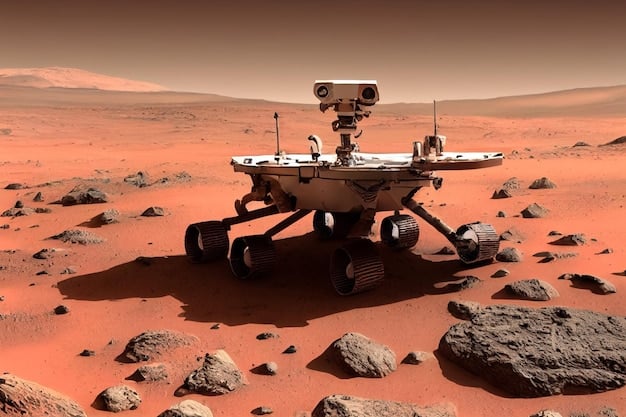
AI algorithms can identify patterns and anomalies in the data, helping scientists make discoveries more efficiently. This capability is particularly useful for missions aimed at understanding the composition of planets, searching for extraterrestrial life, and studying the universe’s origins.
In conclusion to this section, artificial intelligence is poised to revolutionize space mission efficiency, augmenting autonomous navigation and data processing to levels beyond human capability.
The Impact of AI on Space Exploration Effectiveness
Beyond enhancing efficiency, AI also plays a crucial role in boosting the effectiveness of space exploration. By providing advanced capabilities in areas such as resource utilization, risk management, and scientific discovery, AI enhances the overall success and impact of future missions.
Optimized Resource Utilization
Space missions are resource-intensive, requiring careful planning and management of supplies such as fuel, power, and life support systems. AI can optimize resource utilization by predicting demand, minimizing waste, and identifying opportunities for in-situ resource utilization (ISRU).
- Predictive Modeling: AI algorithms can predict resource consumption based on mission parameters, helping mission planners allocate resources more efficiently.
- Waste Reduction: AI can optimize waste recycling and management systems, reducing the need for resupply missions and minimizing environmental impact.
- ISRU Opportunities: AI can identify and analyze potential sources of water, minerals, and other resources on celestial bodies, paving the way for self-sustaining missions.
Risk Management and Mitigation
Space exploration is inherently risky, with potential hazards ranging from equipment failures to radiation exposure. AI can improve risk management by identifying potential threats, predicting failures, and suggesting mitigation strategies.
AI-powered monitoring systems can detect anomalies in spacecraft systems, providing early warnings of potential failures. This allows mission controllers to take proactive measures, preventing catastrophic events and ensuring mission safety. How will the increasing use of artificial intelligence in space exploration impact the efficiency and effectiveness of future missions? It will provide greater insight and improve safety in a dangerous environment.
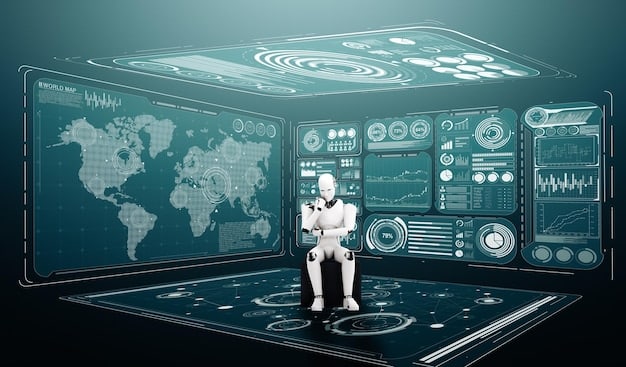
AI also plays a vital role in enhancing the effectiveness of space exploration by providing advanced capabilities in resource utilization and risk management.
AI’s Role in Spacecraft Design and Manufacturing
The design and manufacturing of spacecraft are complex processes that require significant expertise and precision. AI is revolutionizing these processes by enabling automated design optimization, predictive maintenance, and advanced quality control, leading to more efficient and reliable spacecraft.
Automated Design Optimization
Traditional spacecraft design often involves iterative manual adjustments, which can be time-consuming and suboptimal. AI can automate the design process by exploring a wide range of design options and identifying solutions that meet specific performance requirements.
- Generative Design: AI algorithms can generate multiple design options based on predefined parameters, such as weight, strength, and cost.
- Topology Optimization: AI can optimize the structural design of spacecraft components, reducing weight while maintaining structural integrity.
- Performance Simulation: AI can simulate the performance of different designs under various conditions, helping engineers identify and address potential issues early in the design process.
Predictive Maintenance and Quality Control
AI can also enhance the reliability of spacecraft by enabling predictive maintenance and advanced quality control. By analyzing data from sensors and inspection systems, AI can identify potential defects and predict when maintenance is needed.
This approach reduces the risk of unexpected failures and extends the operational life of spacecraft, ensuring that they remain effective throughout their missions.
To summarize, AI automation of space design and manufacturing is optimizing performance, promoting reliability, and promoting mission success.
AI-Driven Discoveries: The Future of Space Science
AI is not only transforming how we explore space, but also how we conduct scientific research. By automating data analysis, identifying patterns, and making predictions, AI is accelerating the pace of discovery and enabling scientists to tackle complex questions about the universe.
Automated Data Analysis and Pattern Recognition
Space missions generate vast amounts of data, including images, spectra, and telemetry. Analyzing this data manually is a labor-intensive process that can take years.
AI algorithms can automate data analysis, identifying patterns and anomalies that might be missed by human researchers. This capability is particularly useful for missions aimed at studying distant galaxies, searching for exoplanets, and mapping the cosmic microwave background.
Predictive Modeling and Simulation
AI can also assist scientists in developing predictive models and conducting simulations of complex phenomena. By analyzing historical data and identifying trends, AI can predict future events, such as solar flares and asteroid impacts.
These predictions can help scientists prepare for potential threats and develop strategies to mitigate their impact. AI also allows researchers to simulate the evolution of galaxies, the behavior of black holes, and other complex processes, providing insights that are difficult to obtain through observation alone.
In conclusion, AI enhances the pace and depth of scientific discovery, helping scientists tackle complex questions about the universe.
Challenges and Considerations for AI in Space Exploration
While the potential benefits of AI in space exploration are immense, there are also challenges and considerations that must be addressed to ensure its safe and responsible implementation. These include algorithmic bias, cybersecurity, and the ethical implications of autonomous decision-making. How will the increasing use of artificial intelligence in space exploration impact the efficiency and effectiveness of future missions? The answer depends on addressing these challenges effectively.
Algorithmic Bias and Fairness
AI algorithms are trained on data, and if that data reflects existing biases, the algorithms may perpetuate those biases. In the context of space exploration, this could lead to unfair or discriminatory outcomes, such as biased risk assessments or resource allocations.
- Data Diversity: Ensuring that AI algorithms are trained on diverse and representative datasets is essential for minimizing bias.
- Bias Detection: Developing methods for detecting and mitigating bias in AI algorithms is crucial for ensuring fairness and equity.
- Transparency: Making AI algorithms more transparent and explainable can help identify and address potential biases.
Cybersecurity and Resilience
AI-powered systems are vulnerable to cyberattacks, which could compromise their functionality and lead to mission failures. Protecting AI systems from cyber threats requires robust cybersecurity measures and resilience strategies.
Implementing encryption, authentication, and intrusion detection systems can help prevent unauthorized access to AI algorithms. Developing backup systems and redundancy measures can ensure that AI systems remain operational even in the event of a cyberattack.
| Key Point | Brief Description |
|---|---|
| 🤖 Autonomous Navigation | AI enables spacecraft to navigate autonomously, reducing reliance on human control and improving mission efficiency. |
| 📊 Data Analysis | AI processes vast datasets more quickly and accurately, accelerating scientific discoveries and informing mission decisions. |
| 🚀 Resource Optimization | AI predicts resource needs, minimizes waste, and identifies opportunities for in-situ resource utilization. |
| 🛡️ Risk Mitigation | AI enhances mission safety by identifying potential threats and predicting failures, allowing for proactive measures. |
Frequently Asked Questions
AI’s ability to automate data processing and decision-making is expected to significantly reduce mission timelines, allowing for faster scientific discoveries and more efficient resource utilization.
Yes, AI algorithms can analyze data from telescopes to identify patterns indicative of exoplanets, accelerating the discovery process and potentially finding habitable worlds.
In deep space travel, AI is expected to handle autonomous navigation, resource management, and real-time problem-solving, reducing reliance on delayed communications with Earth.
Potential risks include algorithmic bias, cybersecurity threats, and the ethical considerations of autonomous decision-making in critical situations, all of which need careful management.
Although initial investment may be high, AI can optimize resource use, reduce mission times, and prevent failures, potentially leading to long-term cost savings and increased efficiency.
Conclusion
In conclusion, the integration of AI in space exploration holds tremendous promise for enhancing the efficiency and effectiveness of future missions. How will the increasing use of artificial intelligence in space exploration impact the efficiency and effectiveness of future missions? It will transform how we explore the cosmos, making missions smarter, faster, and more successful.
By addressing the challenges and considerations surrounding AI implementation, we can unlock its full potential and usher in a new era of discovery in space exploration.
